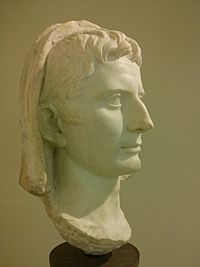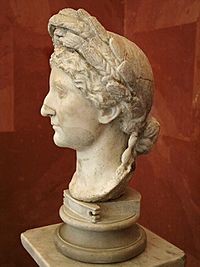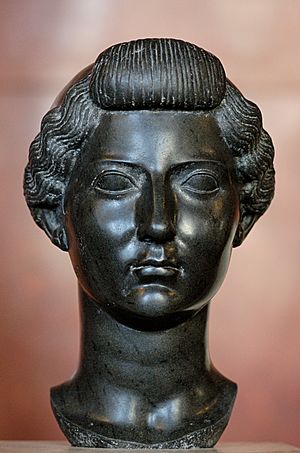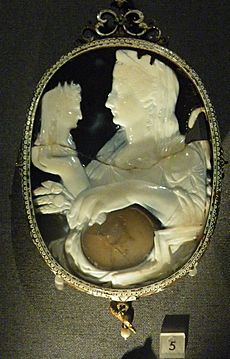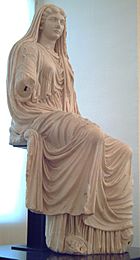Livia facts for kids
Quick facts for kids Livia Drusilla |
|
|---|---|
| Julia Augusta | |
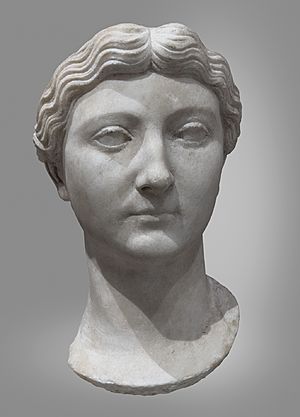
Bust, Musée Saint-Raymond
|
|
| Roman Empress | |
| Tenure | 16 January 27 BC – 19 August AD 14 |
| Born | 30 January 59 BC Rome, Italy, Roman Republic |
| Died | AD 29 (aged 87) Rome, Italy, Roman Empire |
| Burial | Mausoleum of Augustus |
| Spouse |
|
| Issue | Emperor Tiberius Nero Claudius Drusus |
| Dynasty | Julio-Claudian |
| Father | Marcus Livius Drusus Claudianus |
| Mother | Alfidia |
Livia Drusilla (born January 30, 59 BC – died AD 29) was a very important woman in ancient Rome. She became the Roman empress from 27 BC to AD 14. This was because she was the wife of the first Roman emperor, Caesar Augustus. After Augustus died in AD 14, she was formally adopted into the Julian family and became known as Julia Augusta.
Livia was the daughter of a Roman senator named Marcus Livius Drusus Claudianus and his wife Alfidia. She first married Tiberius Claudius Nero around 43 BC. They had two sons: Tiberius and Drusus. In 38 BC, she divorced Tiberius Claudius Nero and married Octavian, who was a powerful political leader.
In 27 BC, the Roman Senate gave Octavian the special title Augustus. This made him the first emperor of Rome. Livia then became the Roman empress. She was a trusted advisor to her husband and had a lot of influence. After Augustus passed away in AD 14, her son Tiberius became the next emperor. Livia continued to be very influential as the emperor's mother. She died in AD 29 at the age of 87. Years later, in AD 42, her grandson Claudius made her a goddess, giving her the title Augusta.
Contents
Early Life and First Marriage
| Roman imperial dynasties | |||
| Julio-Claudian dynasty | |||
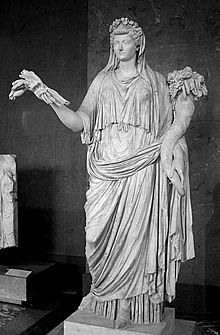 A statue of Livia as Ops, a Roman goddess, holding wheat and a cornucopia (horn of plenty). |
|||
| Chronology | |||
| Augustus | 27 BC – AD 14 | ||
| Tiberius | AD 14–37 | ||
| Caligula | AD 37–41 | ||
| Claudius | AD 41–54 | ||
| Nero | AD 54–68 | ||
| Succession | |||
| Preceded by Roman Republic |
Followed by Year of the Four Emperors |
||
| Category | |||
Livia Drusilla was born on January 30, 59 BC. Her father was Marcus Livius Drusus Claudianus, and her mother was Alfidia. The name Drusilla might mean she was not her father's first daughter.
Around 43 BC, Livia married her cousin, Tiberius Claudius Nero. He was a noble Roman who fought alongside Livia's father against Octavian. Livia's father died in battle, but her husband continued to fight against Octavian.
In 42 BC, Livia gave birth to her first child, who would later become Emperor Tiberius. In 40 BC, Livia's family had to leave Italy to escape from Octavian. They went to Sicily and then to Greece.
Empress: Wife of Augustus
After peace was made, Livia returned to Rome in 39 BC. There, she met Octavian. At this time, Livia already had her son Tiberius and was expecting her second son, Nero Claudius Drusus (also called Drusus the Elder).
It is said that Octavian fell in love with Livia right away. He divorced his wife, Scribonia, and Livia's husband was also persuaded to divorce her. Livia and Octavian married on January 17, 38 BC. They stayed married for 51 years, even though they did not have any more children together. Livia was a very important advisor to her husband. She would speak to him on behalf of others and influenced his decisions. This was quite unusual for a Roman wife at that time.
After a big battle in 31 BC, Octavian returned to Rome as a hero. On January 16, 27 BC, the Senate gave him the special title Augustus, meaning "honorable" or "revered." Augustus did not want to be called a king. Instead, he preferred to be known as the "First Citizen of the State." He and Livia became a role model for Roman families. Even with their great wealth, they lived simply in their home on the Palatine Hill.
Livia set an example for noble Roman women. She did not wear too much jewelry or fancy clothes. She took care of her home and her husband, even making his clothes herself. She was always loyal and dedicated. In 35 BC, Octavian gave Livia the special honor of managing her own money. He also had a public statue made of her. She owned mines, farms, and papyrus fields. She also helped many people get important political jobs.
Augustus only had one daughter, Julia. Livia was a very ambitious mother and wanted her own sons, Tiberius and Drusus, to gain power. Drusus was a respected general and married Augustus's niece, Antonia Minor. They had three children, including the future emperor Claudius. Drusus died a few years later in 9 BC. Tiberius married Augustus's daughter Julia in 11 BC. Eventually, Augustus adopted Tiberius as his heir in AD 4.
There were some whispers that Livia was involved in the deaths of some of Augustus's relatives. These included his nephew Marcellus and his grandson Agrippa Postumus. Historians like Tacitus and Cassius Dio mentioned these rumors. However, modern historians often think these stories were spread by Livia's political enemies.
Life After Augustus
Augustus died on August 19, AD 14. Soon after, the Senate declared him a god. In his will, Augustus left a large part of his wealth to Livia. He also adopted her into his family and gave her the honorary title Augusta. These actions allowed Livia to keep her high status and power after her husband's death. She was then known as Julia Augusta.
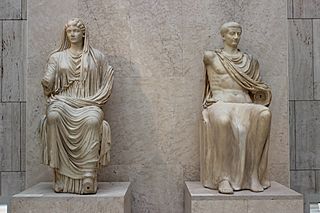
For a while, Livia and her son Tiberius, who was now the emperor, seemed to get along well. It became a serious crime to speak badly about her in AD 20. In AD 24, Tiberius even gave his mother a special seat at the theater, next to the Vestal Virgins. Livia had a lot of unofficial but real power in Rome.
However, Tiberius eventually became annoyed by his mother's political influence. He did not like the idea that she might have helped him become emperor. At the start of his reign, Tiberius stopped the Senate from giving Livia the title Mater Patriae ("Mother of the Fatherland"). This title was similar to the one Augustus had, Pater Patriae ("Father of the Fatherland").
Some ancient historians say that Livia was very bossy and interfered in Tiberius's decisions. For example, she helped a woman named Urgulania, who was a friend of hers, avoid legal trouble. She also helped Munatia Plancina, who was accused of murder. In AD 22, Livia dedicated a statue to Augustus in Rome and put her own name before Tiberius's name.
Some historians also suggest that Tiberius left Rome to live on the island of Capri because he could no longer stand his mother. In AD 22, Livia became very ill, and Tiberius rushed back to Rome to be with her. But in AD 29, when she finally died, he stayed on Capri. He said he was too busy and sent his grandson Caligula to give the funeral speech. Tiberius also refused to make her a goddess, saying it was her own wish. He also canceled many honors the Senate had given her after her death.
It was not until 13 years later, in AD 42, that Livia's grandson Claudius became emperor. He restored all her honors and finally made her a goddess. She was named Diva Augusta (The Divine Augusta). Her image was carried in a special chariot at public games. A statue of her was placed in the Temple of Augustus next to her husband's. Races were held in her honor, and women were told to use her name in their sacred promises.
Livia's country home, called her Villa ad Gallinas Albas, is being excavated today. Beautiful paintings of gardens from her villa can be seen at the National Museum of Rome. One of the most famous statues of Augustus, the Augustus of Prima Porta, was found at her villa.
Personality and Influence
Ancient writers generally describe Livia as a proud and dignified woman. She was loyal to her emperor husband and was a worthy partner for him. She always acted with grace and poise, whether as a wife, mother, or widow. One story says that when someone asked her how she earned Augustus's respect, she replied that it was by being very proper herself, doing what pleased him, not interfering in his business, and pretending not to notice his other interests.
However, some people thought that after Augustus died, Livia became too proud and openly desired power. Livia had always benefited from the great admiration that Augustus had created around himself.
Livia played a very important role in the lives of her sons, Tiberius and Drusus. Her part in the divorce from her first husband, Tiberius's father, is not fully known. She also played a role in Tiberius's divorce from his first wife, Vipsania Agrippina. This divorce was at Augustus's request and caused Tiberius great sadness, as he was forced to leave the woman he loved for family reasons.
Images for kids
See also
 In Spanish: Livia Drusila para niños
In Spanish: Livia Drusila para niños
 | May Edward Chinn |
 | Rebecca Cole |
 | Alexa Canady |
 | Dorothy Lavinia Brown |


